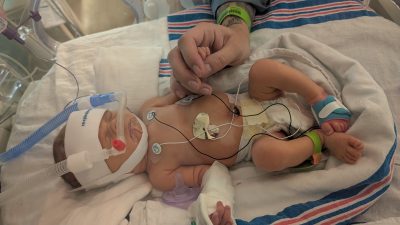Northern Westchester Hospital Saves Life of Mother, Premature Infant
News Based on facts, either observed and verified directly by the reporter, or reported and verified from knowledgeable sources.

For Mariia Konoreva and her husband, Josiah Krembs, coming home with their newborn daughter, Dorothea, on Dec. 19 was the best Christmas gift the couple could have asked for.
But how it happened was not what they had envisioned.
At the end of November, Konoreva, who had been monitoring her blood pressure at home throughout her pregnancy and had experienced some elevated readings, saw that it had skyrocketed to 170/110 mmHg.
“It didn’t go down. I fell asleep, though, but in the morning, I was hoping for the best,” Konoreva said. “I was hoping it would go away. But in the morning, it was still the same.”
She and Krembs were soon on their way from their Yorktown home to Northern Westchester Hospital in Mount Kisco. As it turned out, Konoreva had severe preeclampsia, a complication of pregnancy that often results in high blood pressure, among other potential symptoms.
Doctors made the decision that in the 35th week of pregnancy and about a month ahead of schedule, Dorothea, who Konoreva and Krembs call Dot, to induce pregnancy.
“But I was so against the idea that the baby was going to be delivered earlier,” Konoreva said. “I was hoping everything goes smooth and natural.”
However, Dr. Rick Stafford, the director of neonatology at Northern Westchester Hospital who treats premature babies, said there is no cure for preeclampsia, which is one of the most common reasons why babies are born prematurely. There is also a greater chance for preeclampsia in a woman’s first pregnancy, which was the case for Konoreva.
In this instance, the call was made to deliver Dot because the mother’s life could be at risk, Stafford said. Doctors are still not certain what causes preeclampsia.
“We can mitigate some of its symptoms, they can give medication, they can give magnesium, they can give magnesium sulfate, but really the only cure for preeclampsia is to deliver the baby, and many times that’s what has to happen,” Stafford said.
The turn of events took the couple by surprise. Krembs said with an early January due date, they knew they were eventually going to have to put together a bag that they could grab to go to the hospital, but thought there was still time. They also didn’t have a car seat installed.
“We get in there, they tell us how serious it was,” Krembs recalled. “I was like ‘Can we sleep on it?’ We were told, no, you really don’t have time.”

Konoreva entered the hospital on Dec. 1, and after about 30 hours of labor, she gave birth to Dot on Dec. 3. The couple’s biggest worry was that Dot wouldn’t be ready for the world.
“They cut the umbilical cord and I’m there crying,” Krembs said. “Dot was the only one not crying.”
But then came the post-birth challenges. Weighing just over five pounds at birth, Stafford said the infant was having respiratory issues.
“Her lungs were not as well-developed as we like,” Stafford explained. “She had pretty severe respiratory symptoms and she needed a lot of oxygen and she eventually needed surfactant, which is a chemical in our lungs to keep our lungs inflated. It helps with gas exchange, and as you probably know, premature babies don’t make enough surfactant.”
He said typically by 35 or 36 weeks a baby has enough surfactant to breathe effectively on their own, but that wasn’t the case with Dot. Medical staff needed to inject the drug down her trachea.
The baby also required intravenous fluids and a feeding tube since she needed to be in an incubator, he said. Doctors kept close watch in Northern Westchester’s Level 3 neonatal intensive care unit.
“In many respects, she was acting like a young premature baby,” Stafford said.
But with the treatments and care, Konoreva and Krembs, who met while they were both in Cambodia before the pandemic, were able to take their daughter home just over two weeks after she was born. Konoreva was discharged from the hospital on Dec. 7.
So far, there haven’t been any problems that have arisen, although weight gain has been slow. As of last Thursday, Dot had gained about eight ounces since her birth, Krembs said.
While Dot’s visits to the pediatrician may be more frequent in the early going, if there are no further complications, she will see the doctor for her regularly scheduled visits, Stafford said. Her long-term outlook also looks bright, particularly once she passes through the early weeks without infections.
The parents should exercise common-sense precautions and make sure that no one who isn’t feeling well come close to Dot in the short term, the doctor said.
“She should not have any increase of respiratory illness or asthma; she should not have any increased risk of developmental problems,” Stafford said. “There are some new medications we can give to protect (her) from infection.”
Last week, the Konoreva and Krembs celebrated their first Christmas at home as parents, grateful that the medical staff at Northern Westchester Hospital helped Dot with her first challenge in life.

Martin has more than 30 years experience covering local news in Westchester and Putnam counties, including a frequent focus on zoning and planning issues. He has been editor-in-chief of The Examiner since its inception in 2007. Read more from Martin’s editor-author bio here. Read Martin’s archived work here: https://www.theexaminernews.com/author/martin-wilbur2007/
